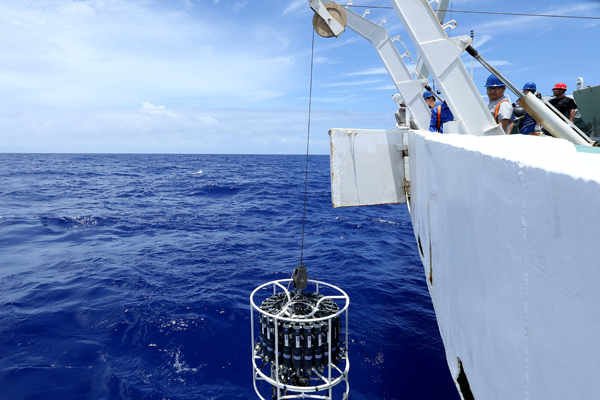Ice that can fire a national energy revolution
 |
|
A device designed to gather data, including water temperature, salinity and depth, is readied for use on May 22, ahead of submersible Jiaolong's planned deep dives. Liu Shiping / Xinhua |
Many say methane hydrate, found under sediments on sea and ocean floors, is the energy of the future because it can generate 10 times more energy than coal and hardly causes any pollution when burned. That's why China's recent success in the drilling methane hydrate in the Shenhu area of the South China Sea is viewed as significant.
The drilling success, thanks to technological breakthroughs, lays a foundation for further improvement of the technologies used. But there is still a long way to go before China can put methane hydrate, or fire ice as it is known, to commercial use. For instance, it has to reduce the cost of extraction, build a smooth network to transport the extracted methane hydrate, and take strict measures to ensure the process does not harm the environment.
That may take a while, but once fire ice is put to commercial use, it will have a huge impact on China and the world. For example, it will help keep energy prices low, and reduce the importance of oil and oil exporting countries.
The commercialization of fire ice will, to a large extent, solve China's energy problem and help it to update its energy structure. China is already the biggest importer of crude oil, importing more than 60 percent of the oil it needs. It is estimated that the fire ice reserves in China's seas could replace 100 billion tons of crude oil and meet the country's energy needs for at least 200 years. So once China succeeds in commercializing the use of fire ice, it will not have to depend on other countries for its energy supply.
Besides, since natural gas accounted for only 6.2 percent of China's total energy consumption last year, compared with the global average of 23.8 percent, fire ice can help China optimize its energy consumption structure.
Given these possibilities, China should accord strategic importance to the commercialization of fire ice. It also needs to increase its human, financial and technological, and other resource inputs into research and development, so as to commercialize fire ice as soon as possible.
It is also extremely important for China to firmly defend its maritime energy resources and territories while expanding the space for global cooperation to exploit them. With the importance of maritime resources becoming increasingly important, China could cooperate with the economies involved in the Belt and Road Initiative to optimize the use of energy resource structures.
More important, apart from making all-out efforts to commercialize fire ice, China should also expedite the construction of its natural gas infrastructure, in order to become an influential player in the global natural gas sector. It should, for example, break the monopolies in the natural gas exploitation sector, and encourage private capital to co-work with State-owned enterprises to exploit natural gas resources. Only through the joint efforts of the SOEs and private enterprises can China realize its plan for energy security.
The author is a researcher at Institute of World Economics and Politics, Chinese Academy of Social Sciences.



















